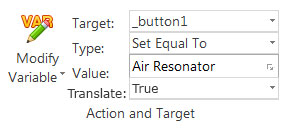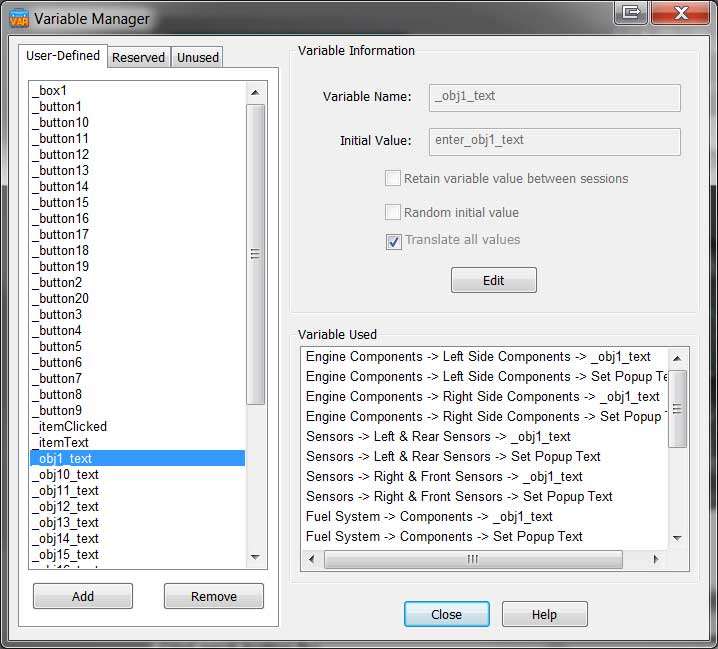Translating variables
July 18, 2016 12:00 AM
I search and found this post - http://community.trivantis.com/forums/topic/translate-variables-initial-values/ but there was no follow up.
We were sold the product on its ease of translation but why is there no option of outputting any variable values?
My plan is to create templates for others for ease of use and consistent look/feel, but if outputting the variables is not feasible, it will put a wrench into my plan.
Any ideas?
- Chuck
Discussion (11)
There's isn't a "one click" solution regarding variables in the product. However it's a great suggestion so I'll be bringing it up to our developers.
Publish to web. Open the index.html file. All the variables you created should be declared just after the Reflow() function near the top. The index[1] of each is the initial value.
Is that what you are looking for?
Is that what you are looking for?
I was referring to the use of the Translations tool built into the tool. It outputs any text displayed in text blocks, but not values (text) used in variables.
I attached your picture to the feature request I submitted :)
This will definitely work and this is what I would do. The problem is, you have to be careful not to break anything and not to miss anything. So not very smooth but will certainly work.
If you used XML texts with Flash, you will find Lectora's Dynamic Text feature useful. It exports the contents of your designated text boxes to XML and loads it on the fly. So you can create a course, publish it, and change the XML if you need to change something quick (or replace it with a translated XML file). No need to launch Lectora and re-publish.
Still doesn't solve the problem of translating the variables and all the "modify variable" actions. If I were building a multi-language title, I'd probably try to avoid using "modify variable" actions that deal with text.
But thank you for the suggestion Darrel. At least that is a work around for the time being.
I haven't touch Lectora since 2005 time frame and I still find some of the minor limitations frustrating, but it is a good tool. When I used in back then, I used Flash in Lectora to play audio and load XML for text as it was much easier to localize. Since we are moving away from Flash, I can't use that method today.
I just started playing around with Lecotra last week, so I am relearning some of its functionality.
What do you think of opening the AWT (source) with an XML editor? It contains any embedded text along with variables. As long as only the contents of undefinedaction id="41956" parent="41954" on="show"undefined_obj1_textundefined1467031538undefinedactionitem actiontaken="modifyvariable" target="variable" targetvariable="31355" modvariable="set"undefined
I attached your picture to the feature request I submitted
Excellent!
Jennifer, I would suggest some form of tick (checkbox) for variables that need to be translated. See attached pics.


Discussions have been disabled for this post
